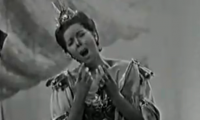In the fever of emotion, any song with a romantic melody and anguished refrain can sound meaningful. But always check the lyrics. You might be in for a shock when you realize that they express a sentiment you could not in a million years condone, or worse, the exact opposite of the way you feel. The following are five classic tunes whose messages should have them stricken from karaoke books.
“Mendocino” (Doug Sahm)
Sir Douglas Quintet, “Mendocino” (1969, from “Playboy After Dark“)
I don’t necessarily approve of grown-ass men dating high school girls, although Sir Douglas certainly makes it seem natural. My issue is not with him screwing a teenybopper, however, but with his insistence that she stay in Mendocino.
A word of advice to chicken hawks: if you’re going to date a teenager, at least observe certain rules of etiquette. Rule number one is leave her better than you found her. At the end of the day, she’s got a whole adult life to live, and you’re wiling yours away dating children. Let her go to college, for Christ’s sake. I’m talking to you Doug Sahm. And to Woody Allen in “Manhattan.”
Woody Allen, “Manhattan” (1979)
Here’s what happens three years down the road from Sahm’s idyll: his “teenage lover” is 20 and pregnant and hates his guts; he is drinking and carousing, having buckled under the prospect of raising a kid in a “love house by the river.” Much like infatuation itself, that shack looks pretty gruesome in the harsh late of day.
“Oh No Not My Baby” (Gerry Goffin/Carole King)
Maxine Brown, “Oh No Not My Baby” (1964)
The Partridge Family, “Oh No, Not My Baby” (1974)
Goffin & King’s lyrics read like a demented playbook on balancing pals and relationships: “When my friends told me you had someone new/I didn’t believe a single word was true/I showed them all I had a faith in you/I kept saying, “Oh no, not my baby.”
Words of wisdom, if you’re Sammi from “Jersey Shore.” In fact, your friends’ unanimous disapproval — nevermind their confirmation that your man is making time with someone else — is a good reason to break off a relationship. The singer doesn’t see any problem with denying her boyfriend’s infidelities though, and even boasts about not listening to her mother’s advice. (If pop songs were horror movies, this would be tantamount to announcing “be right back.”) There’s a term for people who tune out their friends’ warnings and stick by their partners against all sense: “someone’s bitch.”
Even the singer acknowledges that her boyfriend “might have had a last-minute fling.” But then he gives her a ring. That leaves her cuckolded, friendless, and bejeweled. There’s values for you.
I Believe in You (Neil Young)
Neil Young, “I Believe in You” (2010)
When I was 18, I dated a guy I was just crazy about. I used to listen to this song on my way to Sociology 101, tuning out all but the titular line, because it just sounded like the way I felt. When I finally listened to the lyrics, I realized they fairly approximated his feelings at the time. This was after he dumped me in a Second Cup.
Despite appearances, this song isn’t a tender ballad to a new partner, but an ode to early-relationship doubts, featuring one of the cruelest refrains of all time: “Now that you’ve made yourself love me/Do you think I can change it in a day?” It’s an anti-love song, from the victor’s perspective at that.
Profound, yes. And, having found myself in Neil’s situation once or twice, I’ve since listened to it with genuine empathy. It’s always made me feel a little foolish though. Nuanced or deceptive — you decide.
“This Old Heart of Mine (Is Weak for You)” (Holland-Dozier/Sylvia Moy)
The Isley Brothers, “This Old Heart of Mine” (1965)
This song accurately describes a situation familiar to many of us: a pathetic, drawn out, one-sided romance in which the person you love uses your feelings against you, takes a territorial piss on your thoughts, and ultimately ruins your life. But unlike Lauryn Hill’s “Ex-Factor” or Dionne Warwick’s “Anyone Who Had a Heart” — both upstanding tracks — this celebrates the experience of being crunched under someone’s heel like frozen dogshit.
Although the music sounds like a happy ending, the lyrics indicate a terrible sickness: “If you leave me a hundred times/A hundred times I’ll take you back/I’m yours whenever you want me/I’m not too proud to shout it, tell the world about it.” It’s really not something to be proud of, guys. The singer describes the exact opposite of what one should do under these circumstances (i.e., go cold turkey and cry to those friends Goffin & King thought so dispensable), and exalts his own bad decisions. Self-esteem is bullshit, apparently.
Malevolent partners are like addictions; concerned parents everywhere ought to have raged in the streets when this song was released, the way they would have had it been called, say, “Doin’ Heroin’s Easier than Not Doin’ It.”
“You’ll Never Get to Heaven” (Burt Bacharach/Hal David)
Dionne Warwick, “(You’ll Never Get to Heaven) If You Break My Heart” (1966)
Finally, for all the pain of being heartbroken, breaking someone’s heart is no picnic. If you have even a modicum of humanity, reducing someone to fits of emotional agony can make you feel like a jerk. In the aftermath, you question whether you made the right decision and grapple with the fact that it would only take a phone call to soothe your feelings, likely at the expense of theirs. You need the comfort of a maudlin tune almost as much as the person you dumped.
Well, delete this proselytizing little earworm from your playlist before you hit “shuffle.” It’s like a nightmare amalgam of your ex and Mrs. Lovejoy, canting an epic nag crossed with a Jonathan Edwards sermon. Similar to an off-colour joke ruined by shades of earnestness, the sentiment could make even a jilted lover uncomfortable: nothing says “emotional abuse” like “demons will torture you for all eternity if you go away.”
Thing is, after a bad break-up, the dumper already feels this way. Leave it to Hal David to articulate the most heavy and irrational of human sentiments, and Burt Bacharach to set them to a feather-light soundtrack.
The moral: if you want good advice, listen to Bobby Womack. Always.
Bobby Womack, “Woman’s Gotta Have It” (1972)
-Alexandra Molotkow






